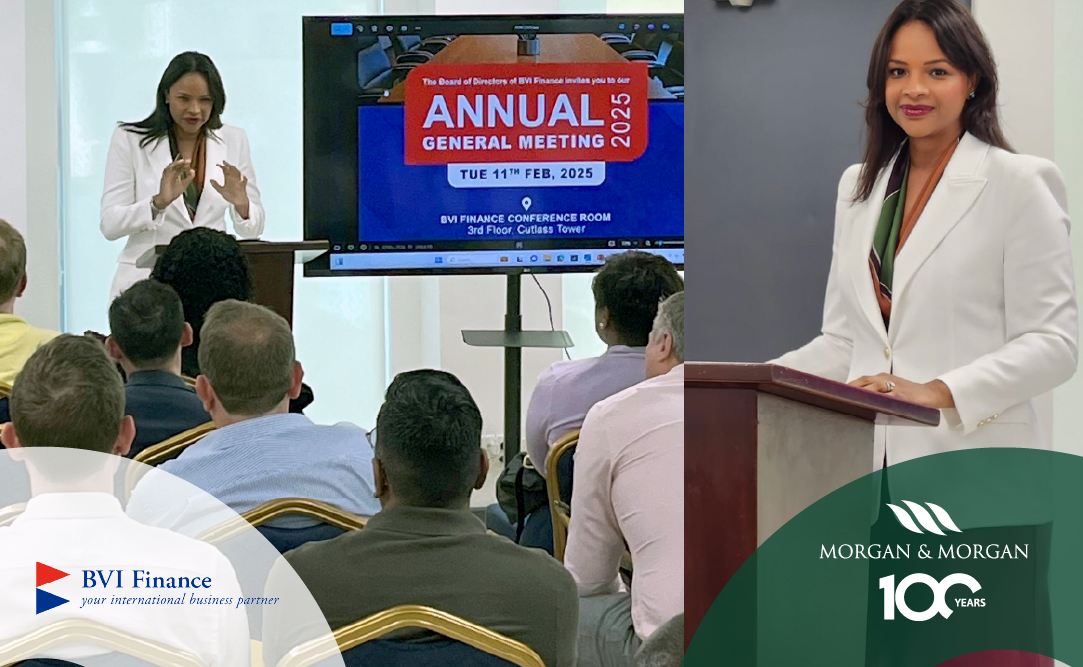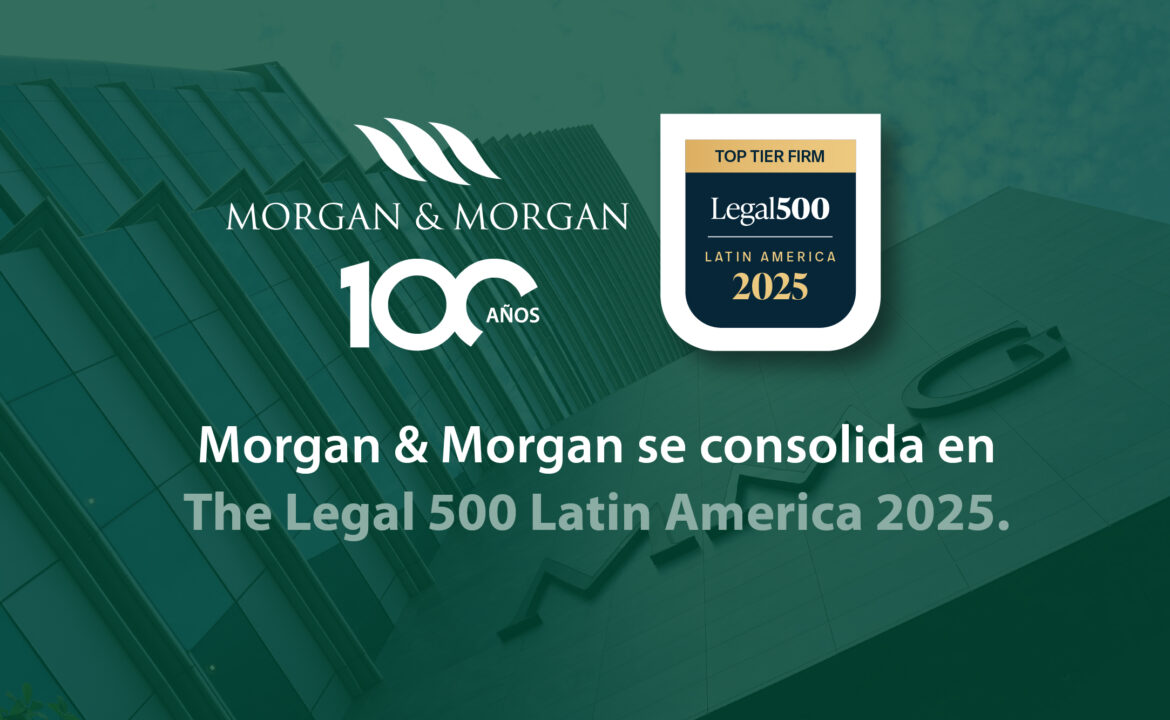Fanny Evans-es
Morgan & Morgan entre las 10 principales firmas de abogados en Centroamérica según Lexology Index 2025
Panamá, 10 de junio de 2025. Morgan & Morgan ha sido nuevamente reconocida como una de las principales firmas de abogados en Centroamérica, al figurar entre las 10 mejores firmas en Lexology Index Central America Report 2025 (anteriormente Who’s Who Legal). La firma también lidera la sección de Panamá con el mayor número de reconocimientos individuales otorgados a una firma panameña.
- Published in Albalira Montúfar, Allen Candanedo, Ana Castillo, Carlos Ernesto Gonzalez, Fanny Evans, Francisco Arias, Francisco Linares, Inocencio Galindo, Jazmina Rovi, Jose Carrizo, Juan David Morgan Jr, Kharla Aizpurua, Luis Manzanares, Luis Vallarino, Mayte Sanchez, news, Ramon Varela, Ricardo Aleman, Rishi Mungal, Simon Tejeira
Fanny Evans elegida en la Junta Directiva de BVI Finance
Fanny se convierte en la primera profesional panameña y latinoamericana experta del sector corporativo y fiduciario en formar parte de este consejo. Islas Vírgenes Británicas, 12 de febrero de 2025. Morgan & Morgan se complace en anunciar que Fanny Evans, socia y miembro del grupo de práctica de Planificación Patrimonial y Servicios Corporativos de la
- Published in Fanny Evans, news
Morgan & Morgan se consolida en The Legal 500 Latin America 2025
Panamá, 25 de octubre de 2024. “Morgan & Morgan es una firma de abogados de clase mundial y, además de ser la firma más grande de Panamá, cuenta con un grupo de abogados extraordinarios”. En número de prácticas y abogados calificados, Morgan & Morgan es la firma de abogados más reconocida de Panamá en The
- Published in Alejandro E. Chevalier, Allen Candanedo, Ana Castillo, Angelica Ortiz, Aristides Anguizola, Banca y Financiamientos_noticia, Derecho Fiscal_noticia, Derecho Laboral_noticia, Energía y Recursos Naturales_noticia, Fanny Evans, Francisco Arias, Francisco Linares, Inocencio Galindo, Jazmina Rovi, Jose Carrizo, Jose Rafael Reyes, Juan David Morgan Jr, Kharla Aizpurua, Litigios Marítimos_noticia, Litigios y Arbitrajes_noticia, Luis Manzanares, Luis Miguel Hincapie, Luis Raven, Luis Vallarino, Maria Teresa Mendoza, Mayte Sanchez, Milagros Caballero, Nestor Broce, news, Omar Rodriguez, Orlando Tejeira, Planificación Patrimonial_noticia, Propiedad Intelectual_noticia, Proyectos_noticia, Ramon Varela, Raul Castro, Registro y Financiamiento de Naves, Registro y Financiamiento de Naves_noticia, Ricardo Aleman, Ricardo Arias, Roberto Lewis, Roberto Vidal, Valores y Mercado de Capitales_noticia
Morgan & Morgan destaca en The Legal 500 Latin America 2024
Panamá, 25 de octubre de 2023. Con 30 abogados y once prácticas destacadas, Morgan & Morgan encabeza la sección de Panamá de The Legal 500 Latin America edición 2024. Además, nueve áreas de práctica reciben la clasificación de Tier 1 en la publicación. Abogados recomendados: Alejandro Chevalier: Resolución de Conflictos. Allen Candanedo: Propiedad Intelectual. Ana
- Published in Alejandro E. Chevalier, Allen Candanedo, Ana Castillo, Aristides Anguizola, Banca y Financiamientos_noticia, Derecho Laboral_noticia, Energía y Recursos Naturales_noticia, Fanny Evans, Francisco Arias, Francisco Linares, Fusiones y Adquisiciones_noticia, Inocencio Galindo, Jazmina Rovi, Jose Carrizo, Juan David Morgan Jr, Kharla Aizpurua, Litigios Marítimos_noticia, Litigios y Arbitrajes_noticia, Luis Raven, Luis Vallarino, Maria Teresa Mendoza, Mayte Sanchez, Miguel Arias publi_es, Milagros Caballero, Nestor Broce, news, Omar Rodriguez, Orlando Tejeira, Propiedad Intelectual_noticia, Proyectos_noticia, Ramon Varela, Raul Castro, Registro y Financiamiento de Naves_noticia, Ricardo Aleman, Ricardo Arias, Roberto Lewis, Roberto Vidal, Servicios Corporativos_noticia, Valores y Mercado de Capitales_noticia
BVI Financial Annual Return
The Legislation The amendments to the British Virgin Islands (“BVI”) Business Companies Act (the “BC Act”) and BVI Business Companies Regulations (the “Regulations”) were published by the BVI government and entered into force on 1 January 2023. In this article we analyze a major change, which is relevant to the accounting requisite of BVI International
- Published in Estate Planning_news, Corporate Services_news, Fanny Evans, News
La nueva Ley de Licencias Comerciales 2023 de Las Bahamas
Nueva Legislación La Ley de Licencias Comerciales de 2023 (la «Nueva Ley»), que deroga y reemplaza la Ley de Licencias Comerciales de 2010 (la «Ley Derogada»), ya está en vigor junto con las Regulaciones de Licencias Comerciales Auxiliares de 2023 (las «Nuevas Regulaciones»). La Nueva Ley es una consolidación y modificación de la legislación relativa
- Published in Fanny Evans, news
STEP Caribbean Conference 2023.
Panamá, 16 de mayo de 2023. MMG Trust (Belize-Bahamas-BVI) tuvo una destacada participación como patrocinador de la reciente Conferencia del Caribe de STEP 2023, “Intrapreneurship – driving change in an uncertain world”, que se realizó en la ciudad de Panamá del 10 al 12 de mayo. La actividad reunió a profesionales del Caribe y Centroamérica
Morgan & Morgan destaca en The Legal 500 Latin America 2023
Panamá, 20 de octubre de 2022. Con 27 abogados y siete prácticas destacadas, Morgan & Morgan encabeza la sección de Panamá de The Legal 500 Latin America edición 2023. Además, ocho áreas de práctica reciben la clasificación de Tier 1 en la publicación. Los 27 abogados de la firma recomendados por esta publicación de referencia
- Published in Allen Candanedo, amanda_barraza_publi, Ana Castillo, Aristides Anguizola, Banca y Financiamientos_noticia, Barraza Amanda, Derecho Fiscal_noticia, Derecho Laboral_noticia, Energía y Recursos Naturales_noticia, Fanny Evans, Francisco Arias, Francisco Linares, Fusiones y Adquisiciones_noticia, Inocencio Galindo, Jazmina Rovi, Jose Carrizo, Juan David Morgan Jr, Kharla Aizpurua, Laura Barrios, Litigios y Arbitrajes_noticia, Luis Manzanares, Luis Miguel Hincapie, Luis Raven, Luis Vallarino, Maria Teresa Mendoza, Mayte Sanchez, Milagros Caballero, Nestor Broce, news, Omar Rodriguez, Propiedad Intelectual_noticia, Ramon Varela, Raul Castro, Ricardo Aleman, Ricardo Arias, Roberto Lewis, Roberto Vidal, Servicios Corporativos_noticia, Shipping and Admiralty Ligitation
The United Kingdom Economic Crime Act
The United Kingdom (UK) Economic Crime (Transparency and Enforcement) Act (the Act”) came into force on 15th March, 2022. A new Register of Overseas Entities will be created and held by Companies House. This new Act forms part of the UK government’s strategy to combat economic crime, while making sure that legitimate businesses continue to
- Published in Corporate Services_news, Estate Planning_news, Fanny Evans, News
Morgan & Morgan nombra a Fanny Evans como nueva socia en su área de Planificación Patrimonial y Servicios Corporativos
Panamá, 28 de diciembre de 2021. Morgan & Morgan se complace en anunciar la reciente promoción de la abogada Fanny Evans como socia de la Unidad de Servicios Fiduciarios. Esta designación viene a fortalecer la reconocida práctica de planificación patrimonial y servicios corporativos de Morgan & Morgan. La Licda. Evans se especializa en derecho corporativo
- 1
- 2











